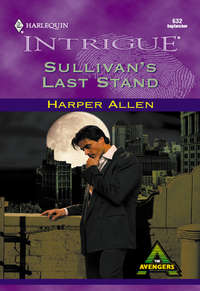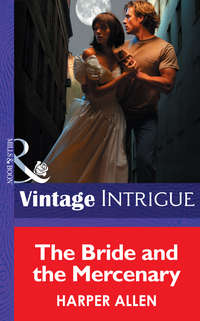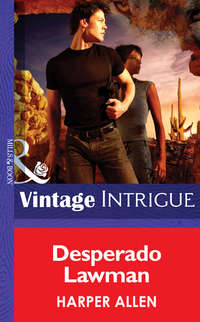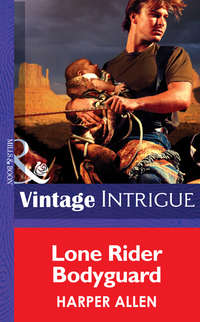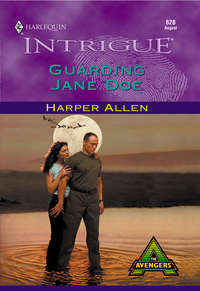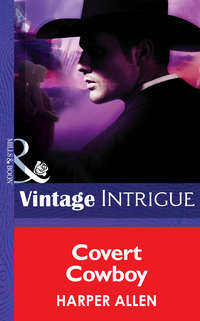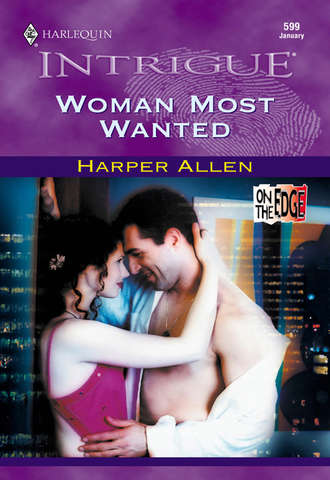
Полная версия
Woman Most Wanted
For crying out loud, D’Angelo—she’s taken off on you. And that pottery-making waitress helped her escape!
He pushed his chair back swiftly and crossed the distance between them in three strides. Flustered, Marg looked up with an expression of innocence that wouldn’t have fooled a Cub Scout—which was no guarantee that it couldn’t fool him, Matt thought disgustedly. He’d screwed up royally.
“She left by the back exit, didn’t she? Where is it?”
“It’s past the kitchen, mister.” Marg snapped her order book closed defiantly and crammed it into her apron pocket. The only other customer left in the place, a bleary-eyed old man in a security-guard uniform, looked up with interest as the waitress’s voice took on a sharp edge. “And she’s had a good five minutes’ start on you, so you might as well just kiss her goodbye. She’s gone. What the heck did you say to her, anyway?”
Matt didn’t answer. He pushed past her and down the short hall at the back of the room. A slightly overweight boy in a white apron over a stained T-shirt was filling jelly doughnuts with an enormous pastry bag. His boredom was replaced by dull interest as first Matt, then Marg, then the geriatric security guard went by at a fast trot, and he stared hopefully at the hallway as if he was expecting more to the parade. The doughnut he’d forgotten he was filling exploded, sending raspberry jelly and powdered sugar all over the counter.
“You a fed?” The security guard pushed importantly past Marg and wheezed out his question at Matt, watching with avid interest as he unlocked the heavy metal door at the end of the hall with some difficulty. “I switched my hearing aid up full blast when you were on the phone and I heard you talking about that big shot that’s gone missing. That redhead with the great gams was a witness—and you let her get away.”
Ignoring the excited old man’s running commentary, Matt slid the lock back on the door.
Behind the coffee shop was an alleyway that seemed to run parallel with the street in front of the building, but it was hard to see more than a few feet. The rain was a silvery curtain blocking out everything but the basic shapes of the buildings backing onto the alley.
“Calm down, Jimmy,” Marg snorted. “It’s just a lovers’ argument.”
“It wasn’t a lovers’ quarrel.” Even though he was standing in the doorway, already the front of Matt’s suit jacket was beaded with moisture. The rain-haloed glow of a street-light shone fuzzily on the three of them as they huddled there. “And she wasn’t a witness, old-timer. She was just a lady with a problem.”
“It looked to me like the only problem she had was you,” Marg said with a scowl. “One minute the two of you are practically melting the frosting off my Boston cream doughnuts, and two seconds later she looked like she’d just lost the only friend she ever had. She was a basket case when she ran out of here—no sane girl would take off into this downpour.”
“Yeah, well…” Matt turned his suit collar up and looked out into the night. It wasn’t going to stop anytime soon, he thought, and somewhere out there Jenna was getting soaked to the skin. “The question of her sanity was what I was worried about. I was about to take her to a hospital.”
“The redhead was crazy? She looked all there to me.” The guard pushed his cap to the back of his head and whistled in disbelief. “Didn’t seem like there was anything wrong with her, if you catch my drift.”
“There wasn’t anything wrong with her.” Marg’s fists went pugnaciously to her hips and her voice rose in scorn. “You’re the one who’s crazy if you were planning on having her locked up in a padded room somewhere. You were sitting right across from her, mister—didn’t you take a good look at her? She was upset, sure. I guess to you she looked a little offbeat, what with her clothes and all. But that sweet girl was as sane as you and me, and if you’d even thought twice about it instead of jumping to conclusions, you’d have realized that.”
“Hold on, Marg,” the old man said uncomfortably. “He’s a federal agent. He must know what he’s doing.”
“He works for the Establishment, Jimmy.” Anger sparked in her eyes, making her look suddenly younger. “He’s the Man—what does he care about ordinary people like you and me and that beautiful, gentle girl, people who think peace and love and doing your own thing are more important than wearing a suit and tie and toeing the corporate line? He probably thinks we all should be carted off to a padded room!”
Jimmy tugged nervously at his jacket, partially hiding the holstered gun and the handcuffs that hung from his belt. Matt didn’t blame him. He felt as though he’d been dropped into the middle of an early Peter Fonda film. Jenna Moon might be Miss Looney Tunes, as the apartment superintendent had so sensitively phrased it, or she might be the saint that this fiery holdout from the ’60s, with her faded apron and work-roughened hands seemed to think she was, but one thing was definite. She certainly had an effect on anyone she came in contact with—and if proof was needed, all he had to do was examine his own emotions.
He felt a sudden affinity for Marg. She’d only known Jenna for a few minutes, but in that short time the course of her life had taken a drastic turn. She’d been given back her hopes and dreams, all because Jenna had taken the time to care about her. Of course she was going to defend her and blame him for the situation she thought he’d created.
“Okay, I was a jerk,” he said. “I lied to her and she knew I was lying and she ran. But I feel the same way about her as you do, Marg, and whether you agree or not, I feel I’ve got a responsibility to find her and get her some help. Did she say anything about where she was heading?”
“No.” The waitress surveyed him stonily for a second, and then sighed. “Sorry for the outburst. I guess I was having a flashback or something.” She glanced over at the kitchen and shrugged. “You could ask Tom if he saw which way she went—he probably had to open the door for her.”
Jimmy, now that the crisis was over, had regained his swagger. “Nice kid, but no rocket scientist, if you catch my drift,” he confided to Matt. He raised his voice. “Tom, get your butt out here! Man’s got a question for you!”
“He’s a little slow, but he’s not deaf.” Marg shot the security guard a black look. As the younger man lumbered out of the kitchen toward them, she fixed a smile on her face. “Tom, you know the red-haired lady who went out of here a little while ago?”
“The pretty one? Sure.” Tom nodded judiciously. “I had to open the door for her. She couldn’t do it all by herself, so she asked me. Her hair smelled good.”
Marg reached out and touched the boy on the arm. “It’s pretty important, Tom. Did she go to where the alley comes out on the street, or did she turn right and head for the back of those apartments?”
With a start, Matt realized that the apartment building she was talking about was the one where he and Jenna had had that ill-fated encounter with West and Mrs. Janeway earlier—the building where she’d insisted she’d lived. It made sense that she’d head back to what she imagined was familiar territory, and he grabbed Tom’s arm, his voice urgent. “Did she go toward the apartments? Is that the way she went?”
With slow deliberation the pudgy teenager looked down at Matt’s hand. Then, as if he’d come to a momentous decision, he shook his head and pursed his lips. “Not toward the apartments, mister. She ran toward the street and a bus was coming and it stopped for her. She got on it and then she told the driver she wanted to go downtown, and he said okay. Then the bus drove away with her on it.” His voice rose. “But she didn’t go toward the apartments. She never even looked that way! She went toward the street, okay?”
He was lying as best as he knew how, Matt thought with rueful admiration. Jenna had done it again—passed a few moments with a stranger and gained another friend for life.
“He couldn’t have heard a conversation on the bus at this distance,” Jimmy said in a low tone. “Not with this downpour making such a racket. The kid’s lying—she musta headed for the back of those apartments like you figured.”
“She got on the bus and it drove away with her,” Tom said. He folded his arms across his chest, adding a new smear of raspberry jelly to the stains already on his apron. There was a smudge of powdered sugar on his cheek. “She didn’t go anywhere near those apartments, mister.”
“Poor kid, he’s trying to protect her,” Marg murmured to Matt. She patted Tom’s arm. “Thanks, Tom. You’d make a pretty good detective.”
“Okay, Marg. I’m going to start making more lemon doughnuts now.” Pointedly ignoring Matt, he turned away from the open door.
If anything, the rain was heavier now. Down the cracked pavement of the alleyway small streams ran and merged together, sweeping bits of paper and cigarette butts and other flotsam along with them. Jenna was out there, Matt thought. He’d been responsible for making her run. Anything could happen to her, and it would be his fault.
“Thanks, Marg. Jimmy, forget anything you thought you heard me talking about on the phone.” Hunching his shoulders, he sprinted out into the downpour, heading toward the apartment building.
THE KID HAD suckered him in. For the third time in as many minutes, Matt wiped the rain from his eyes in frustration and wondered briefly if it was too late to switch careers. A few feet beyond him was the dead end to the alleyway, beside him was an industrial garbage bin with the refuse from the apartment building spilling out of it, and behind him was the building itself—the building where this doomed nightmare of an evening had begun. Jenna hadn’t come this way at all. He’d been finessed by a donut-making teenager who, if he definitely wasn’t a rocket scientist, as Jimmy the security guard had said, certainly had managed to pull a fast one on one Matt D’Angelo, future area director of the Agency.
Jenna could be anywhere by now. He’d lost her.
He was halfway back down the alley when he heard the sound—an unearthly scream that floated eerily through the night. The hair on the back of his neck lifted in an atavistic reaction and he whirled around, his hand going automatically to his gun before he checked himself.
It had sounded like a baby’s cry—but not like any human baby he’d ever known. A chill that had nothing to do with the rain spread through him. From out of his childhood came, full-blown and as spine-tingling as when he’d first heard it, the memory of a story his great-grandmother had told him and his sister Carmela; the story of the goblin’s child who sobbed and wailed in the forests of her native Calabria to draw soft-hearted maidens to their deaths.
The cry came again, an unearthly, soulless entreaty that turned his blood to ice.
Matt blinked the rain from his eyes, and his mouth thinned to an angry line. He didn’t believe in ghosts or fairy tales or fantasy. He believed in hard facts. He started running, heading blindly toward where the sound had last come from and he felt his foot connect with something.
With a raucous clatter, the lid of a trash can fell to the pavement and rolled a few feet before its noisy progress ended. The next minute he saw a small figure leap from the edge of a nearby garbage bin and felt a searing pain rip its way across his left bicep. Immediately the cold clamminess of his shirt was overlaid with the warmth of blood.
His blood. Dammit, he was bleeding. And he was holding a damn cat!
For the second time that evening he found himself gazing into impossibly blue eyes, but this pair was cross-eyed. They glared myopically out of the triangular, brown-masked face peering from his arms, and even as Matt met that disconcerting gaze, the cat opened its mouth and let out a sobbing wail that gurgled off into an irregular purr.
He’d insisted on proof. He’d refused to believe anything she’d told him, he’d let her run out into the night believing she was what that lying bastard West had called her—Miss Looney Tunes—and now she was on the run, alone and frightened, just because he had to have everything by the book. How could he have been so damn stupid?
The cat in his arms yowled miserably and lashed a rain-drenched tail—which was covered, Matt saw, with a streak of sky-blue paint.
Chapter Four
Jenna was stiff from spending the night on a hard bus terminal bench, her hair looked like the proverbial burning bush, and her dress had wrinkled as only a natural fiber could. Jenna smoothed ineffectually at it with the palms of her hands and realized, for the first time in her life, that there was something to be said for polyester.
The bus station washroom was empty, so when her stomach gurgled the sound echoed hollowly around the tiled room. A skimpy lunch yesterday, no dinner, and she didn’t have any money to buy breakfast.
She shifted slightly, and the muted silvery chime of her ankle bracelet tinkled off into a delicate echo. At the sound, Jenna’s chin lifted and her slumped shoulders straightened.
She hadn’t been able to sleep much last night, and her insomnia hadn’t been because she’d kept slipping off the plastic bench. She’d run a whole gamut of emotions before she’d finally dropped into a fitful doze; from fear and anguish to a sense of betrayal to bewildered confusion. And just as dawn had begun to filter through the grimy terminal windows she’d come to a conclusion that had brought her a faint ray of hope—enough so that she knew she could go on.
Maybe Franklin had passed on the instability that had robbed them both of a normal, settled life. It seemed as if he had, judging from everything that had happened in the last twenty-four hours. But she was Sara Moon’s daughter, too—Franklin had always said that Jenna took after her mother more than she did him—and Sara Moon had been the sanest person Jenna had ever known.
She didn’t remember much about her mother, but she could recall a voice that was never raised in anger, a calm acceptance of Franklin’s spur-of-the-moment upheavals and a reassuring presence that had managed to turn each new and bewildering town into a comforting home for a lonely little girl. Sara Moon was as much a part of her as her father was, Jenna thought. Her mother’s strength would keep her from veering over the edge as Franklin had.
From now on she would live a dull, uneventful, normal life, Jenna decided. If she saw Elvis walking down the main street wearing blue suede shoes and eating a peanut-butter-and-banana sandwich this afternoon, she’d smile politely and walk on. She wouldn’t tell anyone, she wouldn’t phone anyone and she wouldn’t try to convince anyone of her crazy story.
Least of all that snake in the grass Matt D’Angelo.
She walked casually through the bus terminal, drifting by the vending machines and surreptitiously pulling on their handles to see if anything dropped out. Nothing did. There was a line of pay phones flanking the far wall that she’d tried earlier, but just in case, she glided like a hungry shark by them again, flipping open the coin return on each one hopefully. She was walking dispiritedly away from the last one, the bells on her ankle bracelet jingling sadly, when she heard a cascade of coins dropping to the ground behind her.
Jackpot! Jenna stuffed the money into the pocket of her dress and dodged out the nearest exit door as guiltily as if she’d just pulled off a major heist. Half a block away she stopped to count her winnings—four and a half…no, five dollars in quarters. If she was careful, she could get breakfast and lunch out of that.
The tiny corner diner was packed with truck drivers and, for some reason, six or seven young women dressed as if they were going out for an evening’s club-hopping, instead of sitting hunched over cups of coffee and half-eaten pieces of toast at six-thirty in the morning. Just looking at them while she placed her order at the counter, Jenna felt like a wreck, but when a seat at one of the tables became vacant, she slid in with a murmured apology.
At one of the communes she’d lived on a few years ago there’d been a woman who made all-natural herbal cosmetics, but her beeswax lip balm had felt sticky and the buttermilk and orrisroot eyeshadow she’d given Jenna had smelled like—well, like sour buttermilk. She’d never really gotten the knack of makeup after that, Jenna thought.
Out of the corner of her eye she cast an envious glance at the woman sitting beside her. Her lipstick was an iridescent mauve, and her eyelashes were thick and black and the longest Jenna had ever seen. She wore a white denim bomber-type jacket that was so short it showed her navel, and under it was a black lacy bra top. Her skirt was some kind of stretchy fabric that clung to her curves, and under the table five-inch-high stiletto heels lay toppled over on their sides. One of her feet was wrapped around the rungs of her chair. She was massaging the other one when she met Jenna’s interested gaze.
“You a working girl, Ginger?”
It took a moment to realize who she was speaking to, but then Jenna flushed, embarrassed to be caught staring. She tucked a fiery strand of hair behind her ear. “Oh. Yes, I guess I am. I just started a couple of days ago. Sorry I was staring, but I love your lipstick. What’s it called?”
The other woman fished in a tiny purse with a chain-link strap that lay on the table, finally pulling out a black plastic tube. She squinted at it. “Mauve,” she said in a disappointed tone. “What a rip-off name. So who do you work for, Ginger?”
“The Skipper. And the Professor’s her best customer,” another girl said. She flipped open a compact and checked her teeth in its mirror, then snapped it shut and started humming a tune. The other two girls at the table started giggling and humming along with her, and even the woman with the mauve lipstick grinned and joined in. The only words they seemed to know were the last few, and the whole table finished on cue.
“Here on Gilligan’s Isle!”
It had to be a television thing again, Jenna thought in frustration. She smiled weakly. There was so much she’d missed through Franklin’s vow never to own one. People were always using catchphrases that meant nothing to her— “Book ’em, Dano,” or “I’ll buy a vowel, Pat,” or “Lu-u-ucy, I’m home!” For a while it had seemed that every second person was hitting his head and saying, “Doh!” and she’d never figured out what that had been all about. This song had to be something along those lines.
“I work for Parks, Parks,” she said as the laughter subsided. “At the corner of Barton and South Streets.” Just then her breakfast came; scrambled eggs and toast with a side order of home fries and a cup of tea with the tea bag still in it. Jenna stopped talking and started eating.
Nothing had ever tasted so good in her whole life. The eggs were a little greasy and the home fries were a lot greasy and the toast was soggy, but she was so hungry it wasn’t until she was scraping the last blob of grape jam out of the tiny plastic container onto her last triangle of toast that she realized that the table of women had fallen silent.
She looked up in midchew.
“You sure can pack it away.” The woman with the mauve lipstick was staring at her in awe. “You better hope that the johns on the corner of Barton and South like ’em a little chunky, Ginger, ’cause at that rate you’re not going to fit into a size eight much longer.”
Jenna swallowed the last bite of toast and started jiggling the tea bag up and down in her cup. “I don’t usually—”
Johns? She took another look at the table of women, but this time her perceptions weren’t dulled by hunger. Short clingy skirts, full makeup, high heels…not exactly a.m. attire. Not unless a girl had been working all night….
“You’re not one of us, are you?” The question came from the woman who’d started humming the song, and there was an edge of suspicion in her tone. “What are you doing here, slumming?”
“Cool it, Crystal.” The woman with the mauve lipstick stared curiously at Jenna, taking in her wrinkled dress and the faint smudges under her eyes. “She’s right, though—you’re no working girl. You running from some man, honey?”
The rough kindness in her voice was almost Jenna’s undoing. She’d been up half the night, her thoughts chasing each other in ever-tightening circles, and although she’d finally come to a decision about her unanticipated legacy from Franklin, she still hadn’t been able to bring herself to examine the hollow sense of betrayal and loss she’d experienced when she’d realized that Matt was trying to trick her into giving up her freedom.
How could he have done that to her? After that moment of electricity that had passed between them, how could he have reverted so swiftly to being the perfect Agency operative—to that stiffly correct, by-the-book persona that she’d thought was just a mask for the real Matt D’Angelo? He’d been willing to dump her at the nearest hospital and wash his hands of her, just because she’d come off as a little flaky.
Okay, a lot flaky, Jenna admitted to herself. But the man couldn’t have it both ways. Either he should have treated her from the first with an arm’s-length formality or he should have acknowledged that there was some kind of inexplicable bond between them and tried to help her, not have her locked up. He wasn’t allowed to go touching her hand one minute and selling her out the next. That was just confusing, and irritating and…and painful.
“I guess you could say I’m running from a man,” she said slowly. “On top of that, it seems like since I first met him yesterday my whole life’s disappeared—my money’s gone, I don’t have an apartment anymore and even the cat I thought I had doesn’t exist. Not that any of that was Matt’s fault, of course,” she added hastily.
“Honey, you might as well have Welcome written down the middle of your back.” Crystal leaned forward, her earlier antagonism gone. “Don’t be a doormat! Of course it’s his fault. It sounds like he really did a number on you—just like when Tiffany’s man trashed her place and cleaned out her bank account, right, Tiff?”
Mauve-lipsticked lips pursed together disapprovingly. “Stevie was no good, but he never would have had a cat whacked. That’s just plain twisted. Listen, Ginger—if you ever need help or money or anything, here’s the number of this place.”
She rooted around in her purse again and came up with an eyebrow-pencil stub and a pack of matches. Scrawling something on the inside flap of the matchbook, she handed it to Jenna and nodded her head at the unshaven man behind the counter. “Joe takes messages for me, and I’m in here a couple of times a day. You need any money now?”
“No.” Jenna felt a lump rise in her throat, and she gave a hasty cough. “I really am a working girl—just not in the way you meant, I guess.”
“Don’t apologize, Ginger.” Behind the thickly mascaraed lashes Tiffany’s eyes held a hint of wistfulness. “Somehow you didn’t seem the type, anyway. But remember what I said—call if things don’t work out or if this Matt jerk tracks you down and starts hassling you again.”
Jenna nodded, too touched to speak, and rose from the table. She fished out a heavy handful of quarters from her pocket, but before she could start counting out enough for her bill, Crystal’s sardonic voice stopped her.
“We’ll cover the tab, Ginger. Just say hello to the Skipper for us, okay?”
All the way to Parks, Parks the catchy little tune they’d been humming as she left the diner kept running through Jenna’s head. People were pretty nice, once you got to know them, she thought. She’d never need to take Tiffany up on her offer, but the generosity of spirit behind it just bore out what she’d learned growing up on the communes—it didn’t take much to turn a stranger into a friend.
Конец ознакомительного фрагмента.
Текст предоставлен ООО «ЛитРес».
Прочитайте эту книгу целиком, купив полную легальную версию на ЛитРес.
Безопасно оплатить книгу можно банковской картой Visa, MasterCard, Maestro, со счета мобильного телефона, с платежного терминала, в салоне МТС или Связной, через PayPal, WebMoney, Яндекс.Деньги, QIWI Кошелек, бонусными картами или другим удобным Вам способом.


